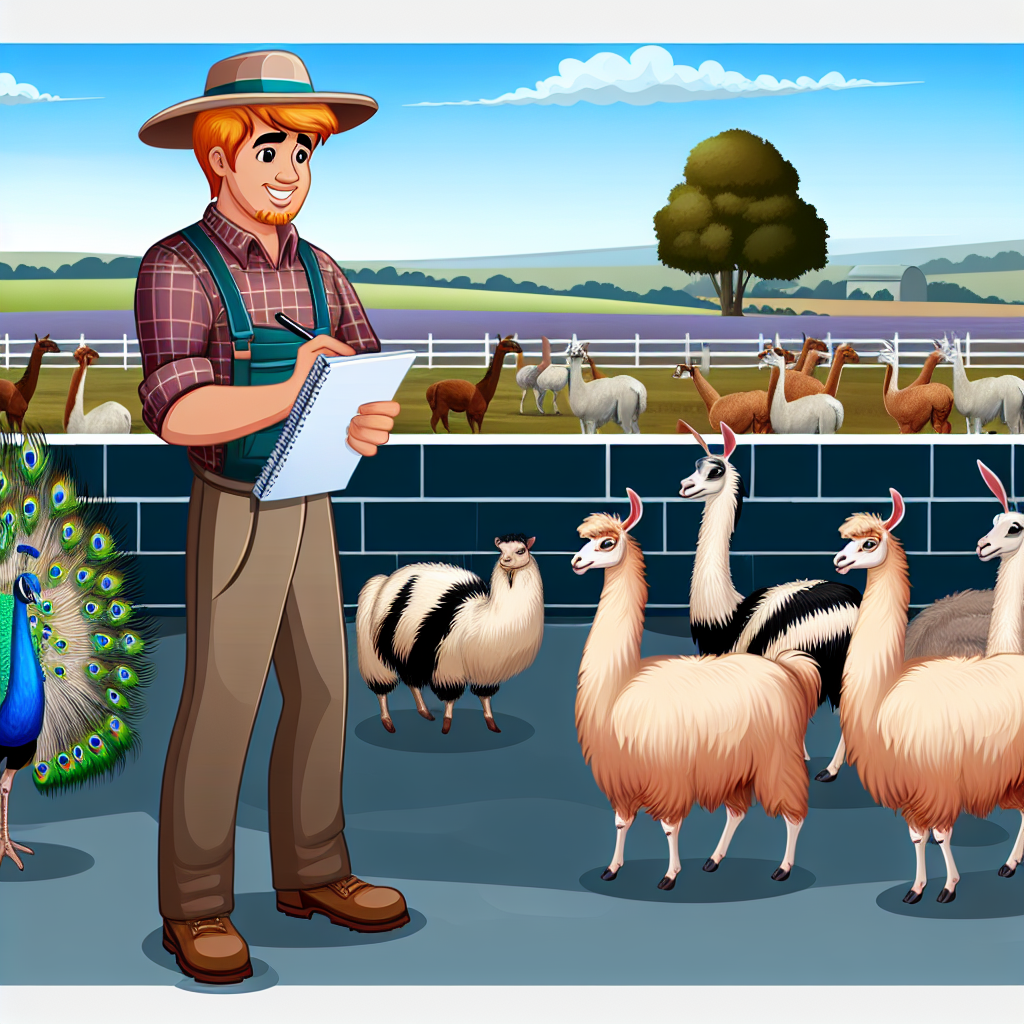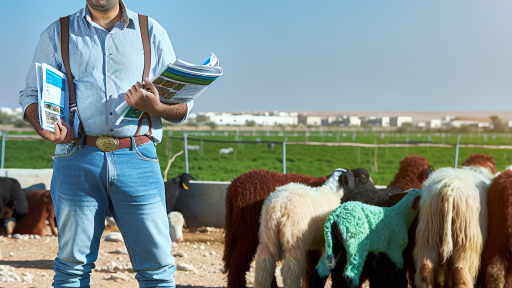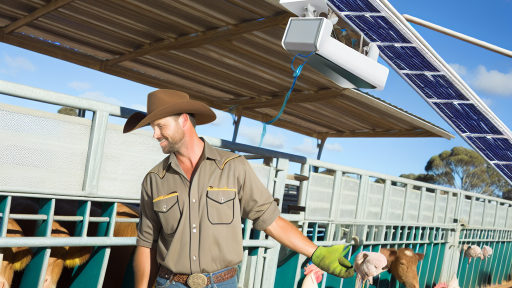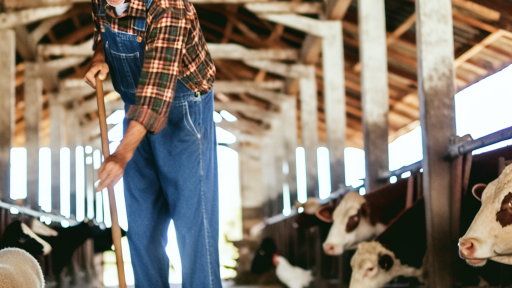Understanding Exotic Livestock
What Defines ‘Exotic’?
Exotic livestock refers to animals not typically found on commercial farms.
These species vary greatly in their habitats, care, and usability.
Common types include llamas, alpacas, and miniature donkeys.
Understanding what makes these animals exotic is crucial for prospective owners.
Characteristics of Exotic Livestock
Exotic animals often have specific care requirements.
For instance, their diets may differ significantly from conventional livestock.
Moreover, many require unique housing to thrive.
Notably, some exotic species have special health concerns.
These factors influence the feasibility of keeping such animals on your farm.
Legal Considerations
Before acquiring exotic livestock, understand the legal regulations.
Certain species may require permits or licenses to own legally.
Additionally, some animals may be restricted in specific regions.
Consult local authorities to ensure compliance with all laws.
Benefits of Raising Exotic Livestock
Choosing exotic livestock can diversify farm income sources.
These animals can also attract interest at local markets and fairs.
Transform Your Agribusiness
Unlock your farm's potential with expert advice tailored to your needs. Get actionable steps that drive real results.
Get StartedFurthermore, exotic breeds can provide unique products.
For example, llamas produce high-quality fiber.
Such benefits can enhance the overall appeal of your farm.
Assessing Your Farm’s Environment
Understanding Climate Conditions
Your climate significantly impacts livestock selection.
Consider temperature ranges during all seasons.
Evaluate humidity levels for specific livestock preferences.
Research local weather patterns to anticipate challenges.
Additionally, consider any extreme weather events.
Evaluating Available Space
Assess the total land area of your farm.
Determine how much space each livestock type requires.
Include grazing areas, shelter, and handling facilities.
Think about how space affects animal behavior and well-being.
Moreover, consider future expansion needs.
Analyzing Essential Resources
Identify the availability of water sources on your farm.
Quality and quantity of feed should also be assessed.
Consider your farm’s accessibility to veterinary care.
Inspect existing infrastructure for breeding and care.
Furthermore, evaluate the support for health and nutrition.
Considering Local Regulations
Research local laws regarding exotic livestock ownership.
Understand permits needed for specific animal species.
Also, consider zoning regulations that affect livestock housing.
Stay updated on any changes in legislation.
Compliance ensures the sustainability of your farm operations.
Researching Popular Exotic Livestock Options
Understanding Exotic Livestock
Exotic livestock can add diversity to your farm.
Showcase Your Farming Business
Publish your professional farming services profile on our blog for a one-time fee of $200 and reach a dedicated audience of farmers and agribusiness owners.
Publish Your ProfileHowever, their care often differs from traditional animals.
Research is crucial before making any decisions.
Benefits of Raising Exotic Livestock
Exotic livestock often provide unique products.
For example, llamas offer fiber, while emus produce oil.
Additionally, many exotic animals are less common.
This uniqueness can attract visitors to your farm.
Challenges of Raising Exotic Livestock
Despite the benefits, exotic livestock can pose challenges.
They often require specialized care and environments.
Furthermore, acquiring permits may be necessary.
Costs for exotic animals can also be higher.
Popular Exotic Livestock Options
-
Llamas
Llamas are known for their gentle demeanor.
They’re excellent pack animals and can help carry loads.
-
Emus
Emus are large flightless birds with distinct feathers.
Their oil is prized for its health benefits.
-
Aldabra Tortoises
Aldabra tortoises are ancient reptiles that require care.
They have unique dietary needs and need space to roam.
Assessing Your Farm’s Capabilities
Consider your farm’s available resources before selecting exotic livestock.
Evaluate the space, climate, and facilities you have.
Additionally, assess your knowledge about their care.
Connecting with Experts
Reach out to local exotic livestock farmers for insights.
Join online forums to learn from experienced owners.
Furthermore, consult veterinarians specializing in exotic animals.
Explore Further: Building Durable Livestock Housing Structures
Evaluating Market Demand
Identifying Potential Profitable Exotic Animals
Start with market research to identify customer preferences.
Survey local markets to understand which exotic animals are popular.
Research online forums and social media for trending species.
Additionally, attend livestock shows and agricultural fairs.
Networking with other farmers can provide valuable insights.
Understanding Pricing Trends
Analyze current market prices for exotic livestock.
Check sources like industry reports and market analyses.
Consider seasonal pricing fluctuations in your evaluations.
Be aware of breeding cycles that impact supply and costs.
Assessing Legal Regulations
Familiarize yourself with local laws regarding exotic livestock.
Ensure compliance with wildlife regulations before purchasing.
Consult with authorities to understand licensing requirements.
Obtain necessary permits to avoid legal penalties.
Selecting Suitable Animals for Your Environment
Evaluate your farm’s specific conditions for compatibility.
Research the habitat needs of various exotic species.
Consider climate, space, and available resources carefully.
Choose animals that are well-suited to your farming environment.
Predicting Long-Term Market Viability
Analyze consumer trends to gauge future demand.
Consider sustainability and ethical concerns surrounding livestock.
Stay informed about emerging market segments and niches.
Develop a business strategy that adapts to changing markets.
Discover More: Sheep Shearing Best Practices for Farmers
Regulations and Legal Considerations for Keeping Exotic Livestock
Understanding Local Laws
Before acquiring exotic livestock, research local laws thoroughly.
Showcase Your Farming Business
Publish your professional farming services profile on our blog for a one-time fee of $200 and reach a dedicated audience of farmers and agribusiness owners.
Publish Your ProfileDifferent states and municipalities have varying regulations.
Consult with your local agricultural department for accurate information.
Failure to comply can result in heavy fines or confiscation.
Permits and Licensing Requirements
Most regions require permits to keep exotic animals.
Apply for necessary licenses well in advance of acquiring livestock.
Check for specific guidelines related to the type of animal.
Some animals may necessitate special permits or inspections.
Animal Welfare Standards
Familiarize yourself with animal welfare laws in your area.
These laws ensure the humane treatment of livestock.
Regular inspections may be a part of compliance with welfare standards.
Review resources provided by animal welfare organizations.
Import and Export Regulations
Understand the rules regarding the import and export of exotic animals.
International trade may require compliance with additional regulations.
Consult with wildlife agencies for specific importation guidelines.
Document all transactions and movements of livestock properly.
Health and Safety Regulations
Exotic animals may carry diseases not commonly found in domestic livestock.
Adhere to health regulations set forth by veterinary authorities.
Regular health checks will help maintain a healthy farm environment.
Keep records of vaccinations and veterinary care for your animals.
Liability and Insurance Considerations
Consider the liability implications of keeping exotic livestock.
Consult with an insurance agent experienced in livestock liability.
Ensure your insurance covers potential injuries or damages caused by animals.
Review policy exclusions and limits thoroughly before purchasing.
Community and Environmental Impact
Assess the potential impact of exotic livestock on your community.
Engage with neighbors to address concerns about noise or safety.
Participate in community meetings to discuss livestock impacts.
Consider the environmental effects of your farming practices.
See Related Content: Scaling Your Fish Farm: From Small Start to Large Operation
Care and Maintenance Requirements for Different Exotic Species
Understanding Animal Needs
Every exotic species has unique care requirements.
Understanding these needs is crucial for proper care.
Different animals thrive in distinct environments.
Furthermore, their diets greatly influence their health.
Proper knowledge ensures they receive appropriate care.
Reptiles and Amphibians
Reptiles often require specific temperature ranges.
Provide heat lamps to simulate natural sunlight.
Humidity levels must also be carefully controlled.
Offer a diet of insects or specially formulated pellets.
Monitor their hydration closely.
Amphibians need moist environments to thrive.
Use aquatic setups for species like frogs and salamanders.
Showcase Your Farming Business
Publish your professional farming services profile on our blog for a one-time fee of $200 and reach a dedicated audience of farmers and agribusiness owners.
Publish Your ProfileProvide fresh water for drinking and soaking.
Birds
Birds require spacious cages for movement.
Include perches of varying sizes and textures.
Feed them a balanced diet of seeds and fruits.
Regular social interaction is essential for their well-being.
Clean their environment frequently to prevent diseases.
Mammals
Exotic mammals have diverse habitat needs.
Build enclosures that mimic their natural habitats.
Provide them with enriching toys to stimulate their minds.
Proper nutrition specific to their species is essential.
Regular veterinary check-ups help maintain their health.
Fish and Aquatic Life
Aquatic species need well-maintained tanks.
Monitor water quality and temperature consistently.
Introduce compatible species to avoid aggressive behaviors.
Feed them high-quality fish flakes or pellets.
Create hiding spots using plants and decorations.
Ensuring Compliance with Local Regulations
Before acquiring any exotic species, check local regulations.
Some species may have restrictions on ownership.
Obtaining a permit might be necessary for certain animals.
Familiarize yourself with legal obligations for care.
Always prioritize ethical practices in animal ownership.
Delve into the Subject: Benefits Of Proper Livestock Waste Management

Creating a Financial Plan
Initial Costs
Starting an exotic livestock farm requires careful budgeting.
Initial costs can vary widely based on livestock choice.
Common expenses include purchase price and transportation fees.
Consider the cost of building appropriate enclosures and facilities.
Don’t forget about feeding and watering systems for your animals.
Vet services and health supplies add to the upfront investment.
Insurance for livestock protects against unexpected losses.
Overall, beginning can require a significant financial outlay.
Long-term Investments
Beyond initial costs, long-term investments are crucial for sustainability.
Build a reserve fund to cover ongoing expenses and emergencies.
Infrastructure improvements should occur as your farm grows.
Invest in high-quality feed to enhance animal health and productivity.
Research and development can lead to better farming methods.
Consider technology upgrades for tracking and managing livestock.
Regular training and educational opportunities can increase efficiency.
Look for partnerships with local suppliers and buyers for sustainability.
Ultimately, a successful financial plan balances initial and long-term needs.
Building Appropriate Housing and Fencing for Exotic Animals
Understanding the Space Requirements
Exotic animals often have specific space needs based on their species.
Showcase Your Farming Business
Publish your professional farming services profile on our blog for a one-time fee of $200 and reach a dedicated audience of farmers and agribusiness owners.
Publish Your ProfileA larger area allows them to exhibit natural behaviors.
Therefore, research the requirements for each animal before building.
Designing Suitable Housing
Housing must provide safety and comfort for exotic livestock.
Choose materials that are durable and easy to maintain.
Additionally, ensure proper ventilation to promote health.
Consider the climate when selecting housing styles.
For example, heat-loving animals require insulated shelters in colder regions.
Ensuring Adequate Fencing
Fencing plays a crucial role in the protection of exotic animals.
Use strong, secure materials to prevent escapes and intrusions.
Moreover, consider the height and depth of the fence.
Some animals are adept climbers or diggers, so height adjustments may be necessary.
Creating a Safe Environment
A safe environment reduces stress for exotic livestock.
Incorporate natural elements, such as trees or shrubs, into their enclosures.
These features provide shade and hiding spots, enhancing their well-being.
Moreover, remove any hazardous materials from the vicinity of their housing.
Establishing Routine Maintenance
Routine maintenance ensures the longevity of housing and fencing.
Regularly inspect for wear and damage to prevent accidents.
Also, clean housing areas to avoid the buildup of waste and pathogens.
Involving a veterinarian in maintenance checks can enhance animal health.
Preparing for Seasonal Changes
Seasonal changes can affect exotic animals’ needs significantly.
During winter, provide additional bedding for warmth.
In summer, ensure access to freshwater sources and shade provisions.
Additionally, consider seasonal storms and their impact on housing stability.
Taking these measures can keep your exotic livestock safe throughout the year.
Networking with Other Exotic Livestock Farmers: Tips and Benefits
Building Connections
Connecting with other exotic livestock farmers enhances your knowledge base.
Attend local farming events to meet diverse farmers in your area.
Social media platforms provide a convenient way to join farming communities.
Participating in online forums allows you to discuss best practices.
Sharing Knowledge and Resources
Farmers can exchange valuable tips on care and management.
Joining a local farmers’ association fosters resource-sharing opportunities.
Collaborative workshops improve skills and expertise among farmers.
Accessing Specialized Markets
Networking opens doors to new market opportunities for your livestock.
Understanding demand helps you plan your stock effectively.
Establishing connections can lead to group buying options for feed and supplies.
Gaining Emotional Support
Networking provides emotional support through shared experiences.
Sharing challenges can help alleviate the stress of farm management.
Celebrating successes with peers creates a sense of community.
Staying Informed on Regulations
Networking aids in understanding local laws regarding exotic livestock.
Farmers share updates on regulatory changes affecting their operations.
Being informed helps you remain compliant with all requirements.
Showcase Your Farming Business
Publish your professional farming services profile on our blog for a one-time fee of $200 and reach a dedicated audience of farmers and agribusiness owners.
Publish Your ProfileAdditional Resources
AVMA Student Externship Locator – AVMA My Veterinary Life




